Notably, the Black Sea Agreement is that the US "will help restore access to world markets for Russian agricultural and fertilizer exports, reduce the cost of marine insurance and enhance access to ports and payment systems for such transactions."
The White House announced that Russia and Ukraine had agreed to “rule out the use of force” in the Black Sea after talks in Riyadh, Saudi Arabia – an initial but important sign of progress toward a peace deal to end the military conflict – a goal that US President Donald Trump is seeking to secure.
In two separate statements on the results of the talks between the parties, the White House said that Moscow and Kiev had "agreed to ensure safety of navigation, eliminate the use of force and prevent the use of commercial vessels for military purposes in the Black Sea".
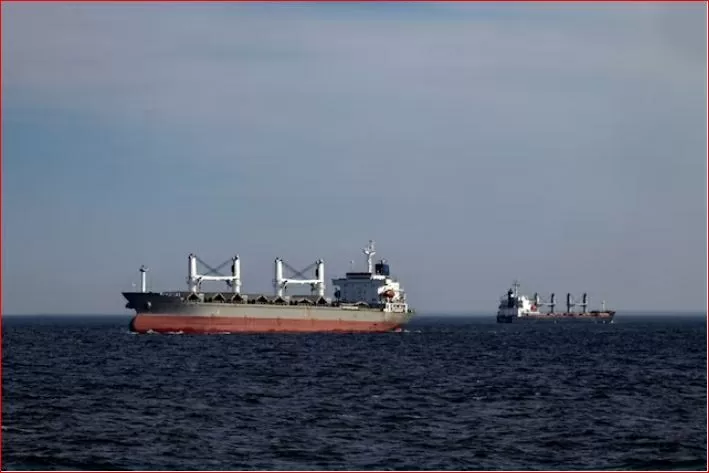 |
| Cargo ships are seen from a Ukrainian coast guard patrol boat as they move in the Black Sea, February 7, 2024. (Source: Reuters) |
However, both Moscow and Kiev admit they are skeptical about the limits of military operations in a region vital to the economies of both countries.
The Black Sea is of fundamental economic importance for both Russia and Ukraine. Their maritime exports to Asia and the Mediterranean originate from there. But for Ukraine it is even more important, a matter of survival, as the ports of Odessa Oblast are their only maritime gateway to international markets. Their maritime capabilities have been severely limited by Russia's control of the ports on the Sea of Azov.
Russia gets the "green light"?
International media reported that before the agreement was reached, the White House had given Moscow the green light. And Washington acted, ignoring Kiev's objections, by pledging to the Kremlin to "facilitate the restoration" of Russian agricultural exports on international markets, which had been severely limited by tariffs and sanctions imposed by Ukraine's Western allies.
The Kremlin later issued a statement, adding that the US and Russia would organize "appropriate control measures through inspections of such vessels", without specifying what these measures would be.
In return, the US will “help restore access to world markets for Russian agricultural and fertilizer exports, reduce the cost of marine insurance, and enhance access to ports and payment systems for such transactions.”
But more specifically about Russia's demands, the Kremlin's statement said that the ceasefire in the Black Sea would only come into effect after sanctions against Russia's agricultural bank, Rosselkhozbank, along with other financial institutions involved in international food trade, including fish products and fertilizers, were lifted.
The Kremlin statement clearly demanded that these organizations be connected to the SWIFT system and that all sanctions and restrictions on food, fertilizers, ships and agricultural machinery be lifted.
SWIFT, short for Society for Worldwide Interbank Financial Telecommunication, is an international financial “artery” that allows for better cross-border money transfers. A month after Russia’s military campaign in Ukraine (February 2022), seven Russian banks were removed from SWIFT. Rosselkhozbank was removed a few months later, in June 2022.
Since the Russia-Ukraine conflict began, the US and its allies have imposed at least 21,692 sanctions on Russian individuals, media organizations or entities in a wide range of sectors, from military, energy, aviation, shipbuilding and telecommunications...
The Black Sea deal would bring Moscow back into the grain and fertilizer markets, allowing it to make a profit and ensuring global food security. Russian Foreign Minister Sergei Lavrov said after Kiev and Moscow agreed to a maritime ceasefire that “not only because we want to make a legitimate profit in fair competition, but also because we are concerned about the food security situation in Africa and other countries in the Southern Hemisphere.”
Meanwhile, President Zelensky has acknowledged that the main obstacle is his government’s opposition to lifting trade restrictions on Russian agricultural exports and marine fertilizers. These products are currently restricted by tariffs and sanctions imposed by the West. The Ukrainian president has argued that these sanctions must remain in place because they serve as leverage for future peace talks.
However, even before the talks in Riyadh, US National Security Adviser Mike Waltz said that resuming the grain deal would be the main focus of the talks and a ceasefire in the Black Sea so both sides could transport grain, fuel and start trading again.
Can the grain deal help restore peace in the Black Sea? Of course, there are many opinions both for and against, but most are in favor. TASS news agency quotes diplomat Grigory Karasin: "Everything was discussed - there was a tense, challenging dialogue, but it was useful. In general, the impression was of a constructive dialogue, which is necessary. We will continue to do this, with the participation of the international community, first of all the United Nations and individual countries."
John E Herbst, senior director at the Washington, DC-based think tank Atlantic Council, called the deal "a helpful step, but not a big one."
Meanwhile, analyst Matthew Kroenig from the Atlantic Council believes this is "a step towards limiting conflict, on the path towards eventual peace".
"Red line" is difficult to cross
The military conflict in the Black Sea has had a significant impact on commercial shipping, especially grain exports, causing disruption to global food supplies. The White House hopes to use the talks in Saudi Arabia to allow free shipping in the Black Sea to be restored.
In fact, this new Agreement can be seen as a continuation of the Black Sea Grain Initiative, which was signed in the second half of 2022 with the mediation of the United Nations and Türkiye, but Russia left just a few months after signing (in 2023). At that time, the Initiative also cleared the Black Sea shipping lanes, allowing both Russia and Ukraine to export grain.
However, Kremlin spokesman Dmitry Peskov and many Russian officials have previously said that the Black Sea Grain Agreement that year failed to meet some of Moscow's demands. The main reason for Russia's exit was that the second part of the agreement, which was aimed at easing Russian agricultural exports, was not implemented. Although Russian food and fertilizer companies were not targeted by Western sanctions, logistical, payment and insurance restrictions hampered shipments.
Ukrainian Defense Minister Rustem Umerov is now demanding that there be “technical consultations as soon as possible” to “agree on all the details and technical aspects of the implementation, monitoring and control of the agreements.” Kiev remains vigilant in the event of new military activity in the Black Sea continuing and demands that “if Russia continues to manipulate and threaten, new, concrete measures against Moscow will be required”…
Meanwhile, in response to the White House's statements, Russian Foreign Minister Lavrov also said that Russia supports the resumption of the ceasefire in the Black Sea, but requires clear guarantees from the White House - meaning an order from President Trump asking Mr. Zelensky not to break this agreement. Russia cannot trust Kiev's words - Minister Lavrov said.
Moscow and Kiev had previously agreed to "increase measures to implement" the "agreement on the prohibition of attacks on Russian and Ukrainian energy facilities." However, the details of the agreement seem to be quite vague, so since the initial agreement was reached last week, each side has made accusations that the other side is violating it and is still carrying out attacks on critical infrastructure.
As such, more talks will be needed to flesh out the details of a ceasefire in the Black Sea and discuss how to implement a ceasefire on energy infrastructure. Any ceasefire will be fragile with trust at a very low level, but as a mediator, President Trump feels his vision of a peace deal is beginning to take shape.
Observers say that while the agreements have made very important strides and can be considered an initial success in President Trump's diplomatic style, it remains to be seen whether both sides will adhere to them and there are still significant obstacles to a complete peace.
US President Donald Trump wants to end what he sees as an unacceptable level of destruction and loss of life. He also wants US taxpayers to no longer bear the cost of supporting Ukraine’s defense against Russia’s military campaign.
But Ukraine has said that recognising territory occupied by Moscow as belonging to Russia is a “red line” it will not cross. Moreover, Ukraine wants post-conflict security guarantees, like peacekeeping troops from NATO members, which Moscow would find difficult to accept.
Source: https://baoquocte.vn/thoa-thuan-bien-den-nga-dang-o-cua-tren-ukraine-phan-nga-yeu-ot-long-tin-o-muc-rat-thap-va-mot-tuong-lai-kho-doan-308875.html


![[Photo] General Secretary concludes visit to Azerbaijan, departs for visit to Russian Federation](https://vphoto.vietnam.vn/thumb/1200x675/vietnam/resource/IMAGE/2025/5/8/7a135ad280314b66917ad278ce0e26fa)
![[Photo] General Secretary To Lam begins official visit to Russia and attends the 80th Anniversary of Victory over Fascism](https://vphoto.vietnam.vn/thumb/1200x675/vietnam/resource/IMAGE/2025/5/8/5d2566d7f67d4a1e9b88bc677831ec9d)
![[Photo] Prime Minister Pham Minh Chinh meets with the Policy Advisory Council on Private Economic Development](https://vphoto.vietnam.vn/thumb/1200x675/vietnam/resource/IMAGE/2025/5/8/387da60b85cc489ab2aed8442fc3b14a)
![[Photo] National Assembly Chairman Tran Thanh Man chairs the meeting of the Subcommittee on Documents of the First National Assembly Party Congress](https://vphoto.vietnam.vn/thumb/1200x675/vietnam/resource/IMAGE/2025/5/8/72b19a73d94a4affab411fd8c87f4f8d)
![[Photo] President Luong Cuong presents the decision to appoint Deputy Head of the Office of the President](https://vphoto.vietnam.vn/thumb/1200x675/vietnam/resource/IMAGE/2025/5/8/501f8ee192f3476ab9f7579c57b423ad)


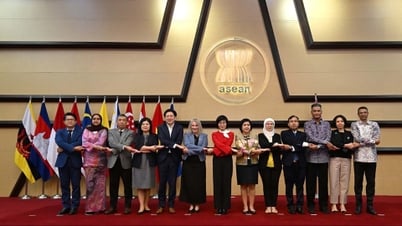
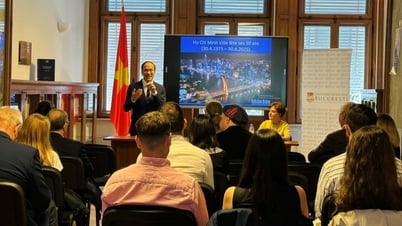
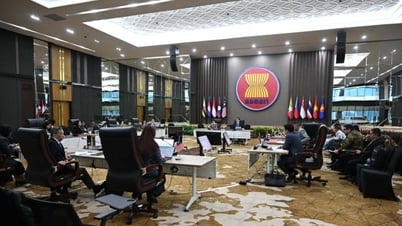
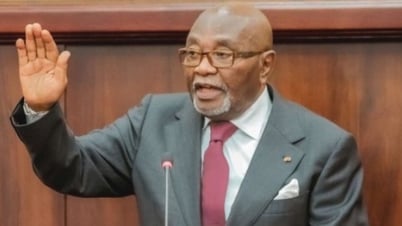
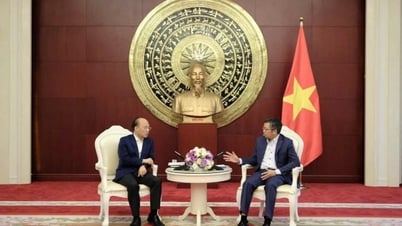





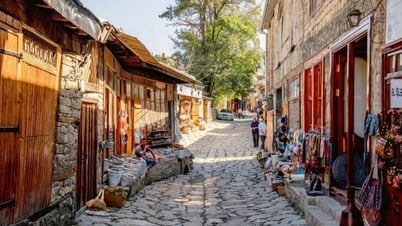


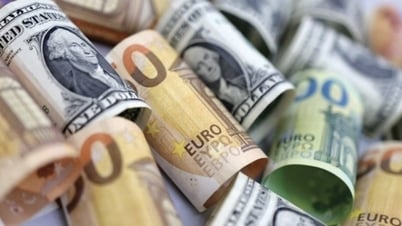
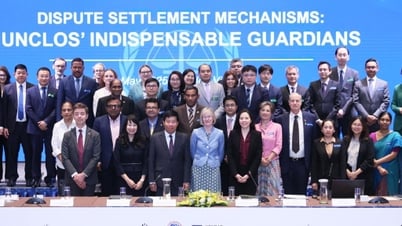

































![[Photo] Prime Minister Pham Minh Chinh talks on the phone with Singaporean Prime Minister Lawrence Wong](https://vphoto.vietnam.vn/thumb/402x226/vietnam/resource/IMAGE/2025/5/8/e2eab082d9bc4fc4a360b28fa0ab94de)















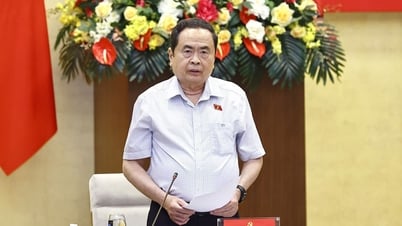

















Comment (0)